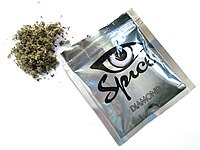
Photo from wikipedia
Alpha-asarone, a major active component isolated from Acorus gramineus, can affect brain functions and behaviors by multiple mechanisms. However, the effect of alpha-asarone on cerebral ischemia-reperfusion (CIR) stroke has not… Click to show full abstract
Alpha-asarone, a major active component isolated from Acorus gramineus, can affect brain functions and behaviors by multiple mechanisms. However, the effect of alpha-asarone on cerebral ischemia-reperfusion (CIR) stroke has not been reported. The present study aimed to investigate the neuroprotective effect of alpha-asarone and the involved mechanisms against CIR stroke. Rats were subjected to middle cerebral occlusion (MCAO) for 2 h. Then the drug or drug-free vehicle was intravenously injected to corresponding groups. After reperfusion for 24 h, the infarct volume was evaluated by triphenyl tetrazolium chloride (TTC) staining. The neurofunctional recovery and post-stroke epilepsy were evaluated. Nissl and hematoxylin-eosin (H&E) staining were used for histological observation. We investigated the protective mechanism of alpha-asarone against the stroke. The results showed that alpha-asarone exhibited a desirable neuroprotective effect, manifested as reducing infarct volume and post-stroke epilepsy and improving neurological function. Histological and flow cytometry analysis revealed that alpha-asarone treatment alleviated cell injury and apoptosis in vivo and in vitro. Furthermore, alpha-asarone decreased GFAP, Iba-1, and LC3II/LC3I expression and increased the expression of p62. These results suggested that alpha-asarone attenuated the CIR stroke injury via ameliorating glial activation and autophagy.
Journal Title: Neuroscience
Year Published: 2021
Link to full text (if available)
Share on Social Media: Sign Up to like & get
recommendations!